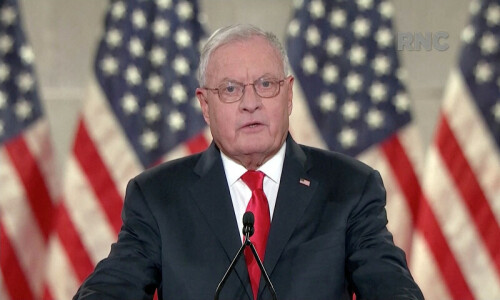THE past few days have witnessed quite a stir on many university campuses in India. In various cities, students have marched to denounce the arrest in Delhi of Kanhaiya Kumar, president of the Jawaharlal Nehru University Students’ Union on charges of sedition.
Mr Kumar’s detractors claim he raised anti-India slogans at an event on campus — a charge he denies — held to mark the execution of Afzal Guru.
Also read: Thousands attend rally for JNU student leader
Political undertones are evident in these developments as Mr Kumar comes from a leftist background, while those leading the campaign against him mostly belong to the ABVP, a student outfit linked to the Hindu supremacist Sangh Parivar.
The student leader was thrashed by lawyers as he arrived for a court appearance in Delhi; police reportedly did little to stop the attack.
The controversy is yet another example of India’s lurch towards the hard right. In today’s India, those disagreeing with the Sangh’s version of how things should be are usually branded as ‘anti-national’.
These toxic levels of ultranationalism are diametrically opposed to democratic values; as we in Pakistan know all too well that if space is ceded to the hard right, very soon democratic principles come under attack.
The hard right in India has been rising steadily ever since it made its violent national debut with the destruction of the Babri Masjid in 1992.
Thereafter, the Sangh’s influence, especially that of the RSS, has been increasing, particularly in the political arena, so much so that under the BJP’s watch, the saffronisation of India is undeniable. While once the RSS worked in the shadows, today it proudly hosts massive public meetings to display its muscle.
Moreover, baiting minorities, especially Muslims, has become kosher, even though many of India’s artists and intellectuals have spoken out against the rising levels of intolerance. This is unfortunate because India has a largely secular constitution and prides itself on being the world’s largest democracy.
But when freedom of expression is threatened and dissent is crushed, secularism and democracy face imminent threat. Sedition is a very serious charge and should not be thrown around loosely.
It appears that a hard-hitting speech made by Mr Kumar critical of the Sangh had a role in his arrest.
Even some ABVP activists have spoken out against the witch hunt. Indian state and society need to reflect upon these developments; what is clear is that ultranationalism and hyper-patriotism are the first step towards the extinction of fundamental rights and freedom of conscience.
Published in Dawn, February 20th, 2016










































